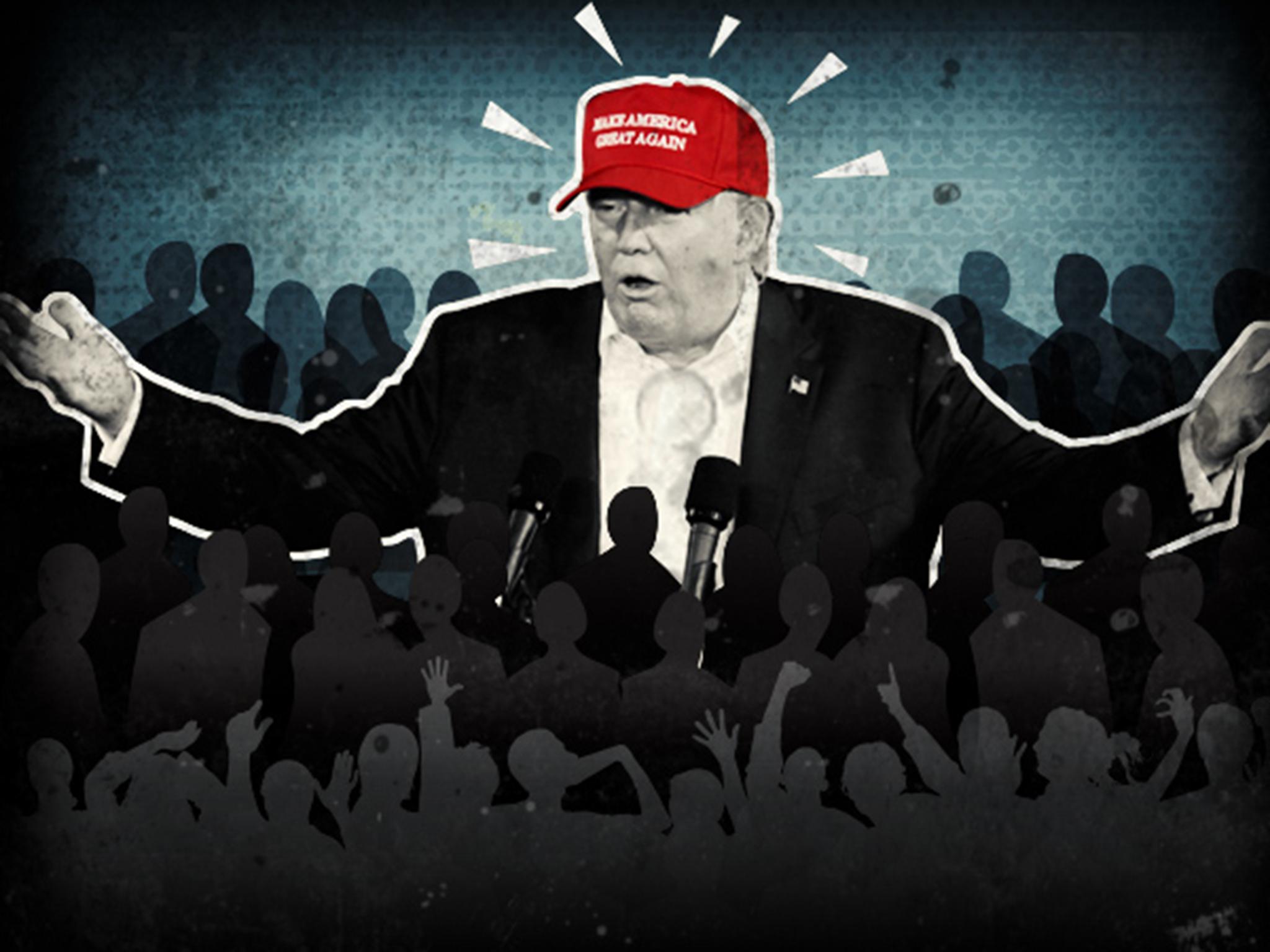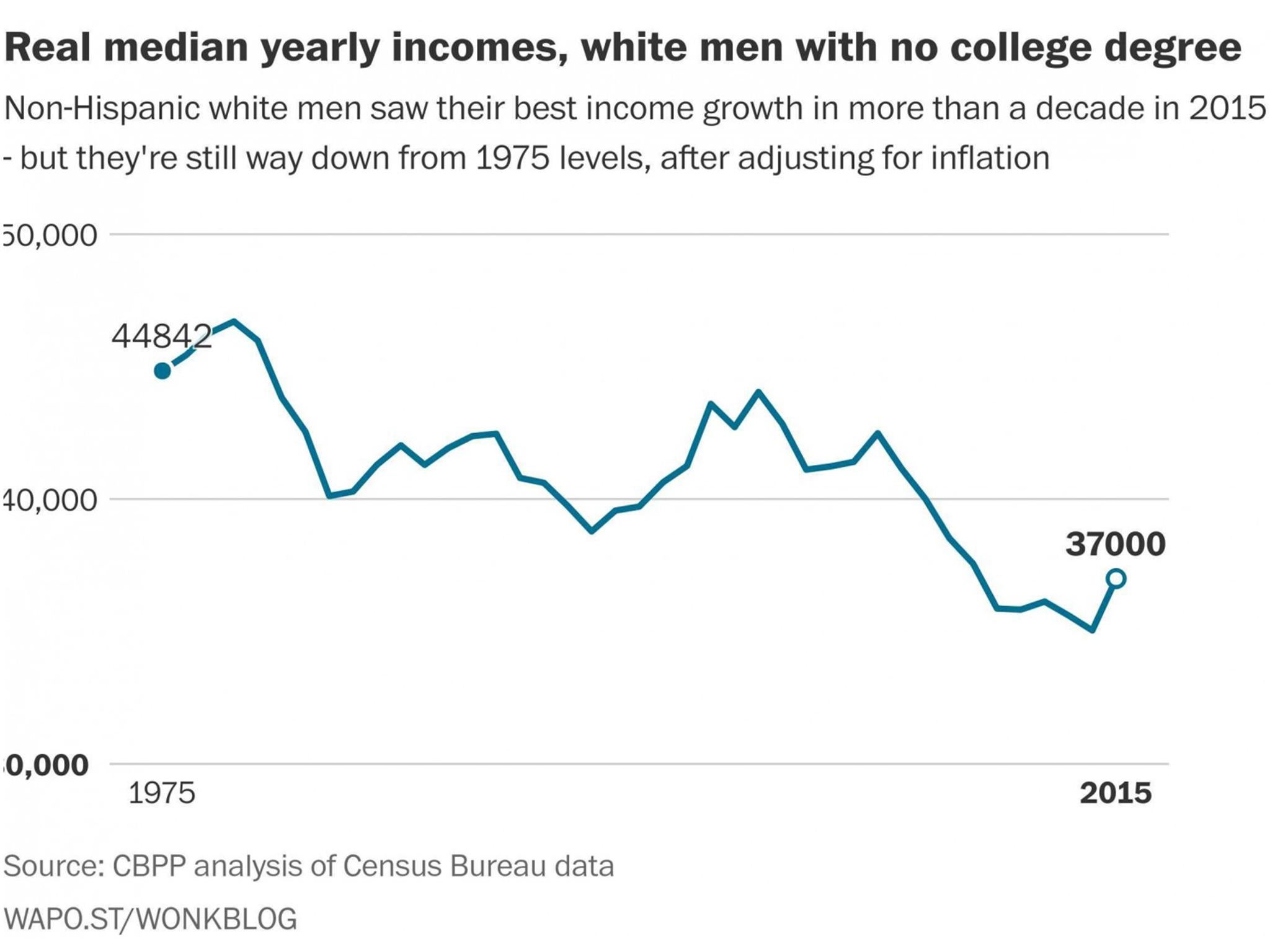How Trump won: The revenge of working-class whites
Whites without a college degree - men and women - made up a third of the 2016 electorate

For the past 40 years, America's economy has raked blue-collar white men over the coals. It whittled their paychecks. It devalued the type of work they did best. It shuttered factories and mines and shops in their communities. New industries sprouted in cities where they didn't live, powered by workers with college degrees they didn't hold.
They were not the only ones who felt abandoned by a rapidly globalizing economy, but they developed a distinctly strong pessimism in its face.
On Tuesday, their frustrations helped elect Donald Trump, the first major-party nominee of the modern era to speak directly and relentlessly to their economic and cultural fears. It was a “Brexit” moment in America, a revolt of working-class whites who felt stung by globalization and uneasy in a diversifying country where their political power had seemed to be diminishing.
It was a rejection of the business-friendly policies favored at various points by elites in both parties, which deepened trade relationships with foreign countries and favored allowing more immigrants in. And it was a raw outburst at the trends of rising inequality and economic dislocation that defined America's economy thus far this century.
Whites without a college degree - men and women - made up a third of the 2016 electorate. Trump won them by 39 percentage points, according to exit polls, far surpassing 2012 Republican nominee Mitt Romney's 25 percent margin. They were the foundation of his victories across the Rust Belt, including a blowout win in Ohio and stunning upsets in Pennsylvania and Wisconsin.
In polling, these voters have expressed deep racial and cultural anxieties. In exit polls they were more likely than the country as a whole to say that illegal immigrants should be deported. But those polls also suggested economic concerns and hostility toward leaders in Washington were much more important factors driving them to Trump.
Half of these voters said the economy was the most important issue in their vote, compared to 14 percent for immigration. A majority said international trade takes away American jobs. Three-quarters said the economy is “not good” or “poor” and nearly 8 in 10 said their personal financial situation was the same or worse than it was four years ago. Two-thirds said they preferred Trump to handle the economy instead of Democrat Hillary Clinton, compared with less than half of the electorate overall.
These frustrations were not new. They had mounted for decades, boiling over in the slow recovery from the Great Recession. That was particularly true among men. From 1975 to 2014, according to census data analyzed by the Center on Budget and Policy Priorities, white male workers without a college degree saw their median incomes fall by more than 20 percent, after adjusting for inflation. Their incomes fell 14 percent between 2007 and 2014.
Last year, amid a much improved US economy and a tightening labor market, their incomes had jumped by 6 percent, according to the Center's analysis. But that increase was nowhere close to enough to make up the ground lost in the recession — let alone since the 1970s.

“It’s completely understandable how these workers feel left behind,” said Jared Bernstein, an economist at the center who is a former aide to Vice President Biden.
At the same time, these working class whites have seen the fruits of American prosperity increasingly go to the very rich. “Superstar” cities, like San Francisco, Boston and yes, Washington, gained even more wealth, and they have been responsible for an increasingly large share of the country's job growth.
Meanwhile, non-college whites saw jobs go away and businesses fold in the rural communities and smaller cities where they are more likely to live, particularly in the Rust Belt.
“Their access to economic opportunity in large measure comes down to the luck of geography,” said John Lettieri, co-founder of the Economic Innovation Group, an advocacy group whose research also showed that this group of voters is underrepresented in America's most prosperous regions.
Many of the downtrodden areas have lost factory jobs over the last several decades, as expanding trade and advancing technology pushed the economy away from production work and into services. Some areas suffered as coal mines closed. Others experienced rapid growth in high-paying energy extraction and support jobs several years ago as hydraulic fracturing boomed, only to watch many of those jobs evaporate when oil prices fell.
The workers increasingly came to see trade deals as the culprit - namely the North American Free Trade Agreement with Mexico and Canada in the 1990s and the effort to open up trade up trade with China in 2000, a decision that economic research suggested has cost America at least 2 million jobs on net.
Trump courted working class whites by promising a restoration of the old industrial economy - through renegotiated trade deals and tariffs on imports; by pledging to deport immigrants, which he said would reduce competition for native-born workers; and by promising rapid economic growth from tax cuts, deregulation and more drilling.
Many economists, including several conservative ones, warn Trump's plans will not deliver the relief those workers are seeking. Some say tariffs won't bring back jobs and could actually lead to recession. Others say Trump's plans ignore more critical issues for the working class, such as the need for improved worker training or measures to encourage workers to migrate to higher-opportunity regions.
“That’s the most disappointing part of the 2016 election,” said Abby McCloskey, an economist who focuses on the middle class and who advised some of Trump's rivals for the GOP nomination. Like Clinton, she said, Trump had “resorted to partisan talking points that the system is rigged against these workers.”
Trump's message did not resonate with black or Latino workers, who earn less at every education level than whites do. Those workers lean Democratic by various degrees but appeared especially repelled by Trump's attacks on immigrants and his stoking of racial resentments.
Critically, his huge margins among blue-collar whites would not have sufficed to deliver him the presidency, if he had not also maintained a slim advantage among whites with college degrees as well. As a group, those workers have been the winners of the new economy, blessed with cheaper imported consumer goods and a persistent wage advantage over their non-college counterparts.
Trump's challenge was inspiring the blue-collar whites without alienating the college-educated ones. He succeeded, and it won him the White House.
The Washington Post
Join our commenting forum
Join thought-provoking conversations, follow other Independent readers and see their replies
Comments
Bookmark popover
Removed from bookmarks